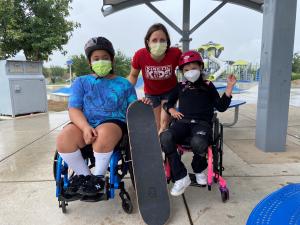ODPHP recognizes National Youth Sports Strategy (NYSS) Champions for their commitment to supporting safe, fun, inclusive, developmentally appropriate, and accessible youth sports opportunities. This blog post is part of a series highlighting NYSS Champions that have found new and creative ways to engage their communities in physical activity and sports during the COVID-19 pandemic.
This post highlights how Kinetic Kids helped youth with disabilities get active through sports during COVID-19.
Kinetic Kids is a nonprofit organization in San Antonio, Texas, that offers sports, fine arts, and educational programming to kids with physical and intellectual disabilities. When the pandemic hit in the spring of 2020, Kinetic Kids knew they had to get creative to keep their participants active and socially engaged in a safe way.
The organization quickly pivoted to virtual programming — even though that would have felt like an impossible undertaking just a year earlier, says Tracey Fontenot, Co-Founder and Co-Executive Director of Kinetic Kids.
“The pandemic showed us what we’re capable of,” Fontenot says. “Our belief in what we can do has really grown — and so has our online capacity!”
Keeping Kids Engaged Virtually
Kinetic Kids offers a wide array of recreational and competitive sports options, like basketball, dance, soccer, and gymnastics. When the organization made the switch to virtual programming, they wanted to make sure participants still had lots of options for getting active.
To do this, they created an online video series called Stay Strong. The series lets kids pick the sport they’re interested in and watch several instructional videos about skills related to that sport. For example, the taekwondo section has videos of instructors demonstrating how to do moves like the front push kick, and the baseball section has videos about throwing, hitting, and base running.
“The videos in the series are fairly short, which helps keep kids engaged,” Fontenot says. “And we love that the videos give kids the independence to try out different things.”
In addition to the Stay Strong series, Kinetic Kids offered real-time virtual exercise classes that instructors led from their homes. Instructors would show participants how to do various exercises — sometimes using items from around the house as weights — chat about how participants were doing, and cheer them on.
Fontenot says these virtual classes were especially popular with participants.
“Some of the kids love exercising, but they also love the camaraderie and the friendships and the relationships with their volunteer coaches,” she says. “And I think a lot of them missed that after the pandemic started. Our virtual classes gave them that connection again.”
Getting Back to In-Person Play
Although many kids attended and enjoyed Kinetic Kids’ virtual classes — with up to 15 kids attending some sessions — the organization still wanted to bring kids together in person once it was safe to do so.
So in the fall of 2020, they started offering in-person programming for activities like soccer and baseball. To keep kids safe, Kinetic Kids put various COVID-19 precautions in place — like holding activities outdoors, making sure participants kept their distance from each other, and requiring everyone to wear masks.
Fontenot says that in addition to getting participants moving, the most important reason to safely bring back in-person programming was participants’ need for social opportunities. In fact, that need is one of the main reasons Fontenot and Co-Founder and Co-Executive Director Kacey Wernli (who are both physical therapists) started Kinetic Kids in the first place.
“As physical therapists, Kacey and I saw kids with disabilities in clinic who weren’t getting socialization and wanted to do what their classmates were doing and what their siblings were doing,” Fontenot says. “That’s always been the framework that guides what we do at Kinetic Kids.”
Celebrating Kids as They Are
Fontenot emphasizes the importance of getting active through sports not just for physical health but for mental health, too. For example, she says many participants at Kinetic Kids might not feel socially accepted at school — but Kinetic Kids is a place where they can come together and be themselves.
In fact, she says many participants have so much fun getting active that they forget they’re exercising in the first place. Fontenot says that for many kids with disabilities, the experience at Kinetic Kids provides a good balance with their traditional physical therapy — where the emphasis is typically on “moving better, sitting better, or walking better.”
“That’s a lot of what they’re told in their life: do this better,” she says. “But at Kinetic Kids, we’re going to celebrate who they are, no matter what.”




